Graham Reid | | 17 min read
Spinal Tap: Break Like The Wind

Rock history is littered with legendary
bands, some more legendary than others. Some of these legends will
live for ever, others even longer. But there is one rock hand which
stands above all others, the most legendary of all legends. It is, in
a word, Spinal Tap.
The story of Spinal Tap is now part of
rock’s rich tapestry, an integral weave in the carpet of popular
music: how Nigel Tufnel and David St Hubbins grew up in the same
block of flats in London’s Squatney; formed the Originals (later
becoming the New Originals when the original Originals from the East
End threatened to sue); how they scored a minor hit with their debut
single Gimme Some Money at the height of the Sixties Britpop boom;
and then went through a roster of names including the Thamesmen,
Flamin‘ Daemons, the Doppel Gang, Waffles, Hot Waffles and the
Tufnel-St Hubbins Band.
They played their first gig as Spinal
Tap in late '66; their first single, Listen to the Flower People,
perfectly capturing the innocence of the hippie movement, and the
subsequent album, Spinal Tap Sing Listen to the Flower People and
Other Favourites went gold, The band got heavier, became more acid
rock and employed the twin-guitar attack of Tufnel, a virtuoso
guitarist whose solos are his trademark, and St Hubbins.
It was Tap as we know it.
Joined by the quiet, measured presence
of bassist Derek Smalls, the lukewarm water between the fire and ice
visionaries of Tufnel and St Hubbins, the group unleashed a series of
critically condemned albums including Silent But Deadly, Brainhammer,
Intravenous De Milo and the ambitious concept album The Sun Never
Sweats.
They were all awful . . . yet they had
something.
Tapheads (the name given to their
Deadicated followers) loved them, and their lack of taste was
curiously vindicated when Nice'N'Stinky, a live track from their Jap
Habit album of ’75, became a huge, surprise hit in the States in
'77. Tap was reborn. Risen again, as it were.
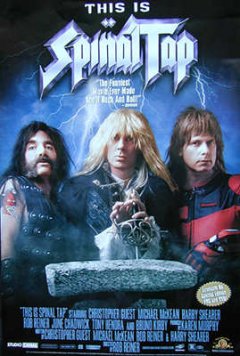 The band reformed, introducing yet
another of rock’s most explosive drummers -- or, more correctly,
exploding drummers -- and their tour of America to coincide with the
release of their controversial Smell the Glove album was filmed for
the now legendary This Is Spinal Tap documentary (“or, if you will,
rockumentary”) by Marti Di Bergi.
The band reformed, introducing yet
another of rock’s most explosive drummers -- or, more correctly,
exploding drummers -- and their tour of America to coincide with the
release of their controversial Smell the Glove album was filmed for
the now legendary This Is Spinal Tap documentary (“or, if you will,
rockumentary”) by Marti Di Bergi.
It was the tour that all but destroyed
the Tap, and Di Bergi captured the madness of rock, the indignity of
roll, and every Tufnel-St Hubbins argument.
Yet again fate -- “that most fickle
of mistresses,” according to Tufnel, the band’s in-house
philosopher and quite deep thinker -- lent a hand, if not loud
applause.
Classic Tap songs like Big Bottom (“drive me out of my mind, how can I leave this behind?”) and Hell Hole might have been overlooked, but Sex Farm became a sudden surprise hit in Japan.
The group embarked on another Far East
tour, fell apart amid arguments with their manager, Ian Faith, and
Tap were no more . . .
Until the early Nineties when . . . the Tap came back.
In mid '92 their first album in a
mercifully long time was released and Break Like the Wind looks like
taking the name Spinal Tap to a new, unsuspecting generation. Despite
some residual bitterness about Di Bergi’s film and a natural
suspicion of the media which they court at every opportunity, Nigel
Tufnel -- because he’s a professional -- spoke candidly about where
Tap was at .................

The return of Spinal Tap couldn’t be more timely. As rock loses direction with bands such as Red Hot Chili Peppers desperately raiding the funk cupboard and groups from Seattle making shoddy second-hand attempts at reviving Led Zeppelin riffs, Spinal Tap stands for classic rock.
Their album Break Like the Wind
represents a return to real values in rock.
Look at the guests clambering over
themselves to play with Tap: Joe Satriani and Jeff Beck play on the
epic title track (so does Slash from Guns ’n Roses, but that's more
a career move on his part). Cher sings a duet on the inspirational
Just Begin Again (“Life is just like a dream, an unconscious
stream, Rise! For you are cream”) and some other fairly famous
people sing and play things, too.
To celebrate the return of Tap,
Billboard magazine gave over a special supplement to the band and,
according to St Hubbins, the new release is a concept album: “The
concept is sales. it sounds crude, but it’s just part of our
maturity."
And it’s working because, like it or
not – and most people don't -- rock needs Spinal Tap. Which is
ironic because here is a band which has just celebrated its 25th
anniversary and hasn't yet had an original idea.
Nigel Tufnel ponders the thought of 25
years deeply, and therefore for a very long time.
“Yeah,” he says finally, "it
just seems like, Well, I was going to say it just seems like
yesterday, but actually it seems like 25 years in fact.
"We didn’t have a party because
you get to the point where you run out of thing to party about. We're
too old, so we get younger people to do that for us. It isn't like
the old days where you’d go to a hotel room and toss the telly out
the window. Now we get a groupie to do that. They enjoy it more,
anyway.”
Tufnel, inventor of the neckless guitar
and a new system of musical notation, sounds almost as if he yearns
for the old days when they were young and naive, hitless and witless.
“Back when we were the Thamesmen or
whatever, we didn’t know we were naive. Maybe we‘re still naive
and we won't know that for another 10 years. It’s like the
philosophers say, if you look forward, you -- umm -- well, you can’t
really look back at the same time. You’d probably tweak something
in your neck “
It is when Tufnel, who admits he isn’t
university material, grapples with such knotty philosophical
questions that you recognise he is one of the thinking men of rock --
a Socrates in satin tights or a Solomon with a really good guitar
collection.
 As the lyrics to the anthemic Majesty
of Rock on the new album say, “When we die, do we haunt the sky? Do
we lurk in the murk of the seas? What then? Are we born again just to
sit and ask questions like these?"
As the lyrics to the anthemic Majesty
of Rock on the new album say, “When we die, do we haunt the sky? Do
we lurk in the murk of the seas? What then? Are we born again just to
sit and ask questions like these?"
Nietzsche couldn't have put it more
concisely ...or to a better riff.
More than simply being a poet (“like
Shelley or Byron,” as bassist Smalls says of him), Tufnel is also a
practical man. He ponders the great philosophical questions . . . but
keeps that common touch. Witness his invention of the folding
wine-glass in those, years when Tap was in semi-retirement.
"You see, so many times in the
past I’ve said, 'Let’s go and have a picnic. You’ve got the
Bovril and sandwiches and fruit, let's bring some wine . . . oh, how
are we going to drink it‘?' You can’t drink wine out of a paper
cup, so this is a folding wine-glass, full-sized and hinged so the
sides fold down and you can put it in your pocket.
“There’s a bit of a problem with
it. It leaks, actually, so by the time the glass reaches your lips
the wine is pretty much in your lap. So then you’ve got to have
some sort of nappy.
“I was reading Hegel the other day
but that was just a bunch of words -- maybe this, maybe that. But
I’ve come up with something dimensional. Alright, it’s not
perfected yet, but that’s not important because I’ve got past the
point of it just being an idea or a drawing. I’ve bloody well done
it.
“And that‘s the message of this
album in a song like Begin Again -- you've just got to keep going.
“The world is spinning - -well, is
the world spinning or is that the sun? Anyway, something is spinning
and you've got to keep spinning, too. I think."
Tufnel admits to keeping a pen and
paper handy to jot down ideas philosophical and musical, he also
keeps a tape recorder at the ready to capture those fleeting ideas
which constantly flow through him. On the album he commits to disc
his masterwork Clam Caravan, on which he plays sitar in the
quasi-Oriental piece which is a showcase for his instrumental
virtuosity.
His fluid guitar playing is everywhere
(well, almost everywhere . . . but more of that soon) and his
literate lyrics are littered with literary lyricism.
In The Majesty of Rock Tufnel poses the
great existential questions within the context of popular music: "The
Majesty of Rock! The Mystery of Roll! The darning of the sock, the
scoring of the goal, the farmer takes a wife, the barber takes a
pole, we’re in this together . . . and ever . . .”
Elsewhere he indulges his interest in
anthropology and religious questions.
“We like to take chances and I read
and experiment with historical ideas, like Stonehenge and the anthems
we write,” he says referring to his magnum opus which begins with
the thought provoking, “In ancient times, hundreds of years before
the dawn of history . . .”
 Tufnel says The Sun Never Sweats on the
new album (“losing is for losers, winners play to win") is
"like a metaphor for someone in love with the British Empire,
the Empire being the woman, I guess.
Tufnel says The Sun Never Sweats on the
new album (“losing is for losers, winners play to win") is
"like a metaphor for someone in love with the British Empire,
the Empire being the woman, I guess.
"But we’re still learning and,
to be honest, there are some things I really don't understand."
Like?
“Like fish. I’m a fisherman, so I
can catch them, but I don't know about them as if I lived under
water.”
With that gift of inquisitiveness
combined with his natural talent for grasping difficult concepts, it
comes as a surprise to hear Tufnel confess to losing information.
“You’ve got a lot of stuff in your
brain which comes and goes . . . . and in my case a lot of it is,
well, it’s gone, really. People say, ‘Do you remember this or
that?' And I say, ‘No.’ So they tell me and I say, ‘No, sorry
it’s gone, not there.’ "
Despite that, Tufnel crafts lyrics
which work on various metaphorical levels simultaneously, some not
always appreciated by his audience of young, out-of-it headbangers.
"See, that title Break Like the
Wind is like a Zen question put out to the audience. The wind doesn't
really break -- it bends, it goes around corners and in and out of
things. You can’t break it, so by saying ‘break like the wind’
it puts that philosophical question out to people."
Yet some would just see the title as a
poor joke about flatulence?
“Oh no, that’s bizarre,” he says
in disbelief. "But I do see what you mean, although I hadn’t
thought of it, hmmmm. But the same thing happened with the song Bitch
School. Some feminist group thought it raised a whole issue and I
said if they couldn't read the words or just listen to the record,
then they shouldn't buy it.
“It’s a song about training dogs,
obviously - it’s so clear."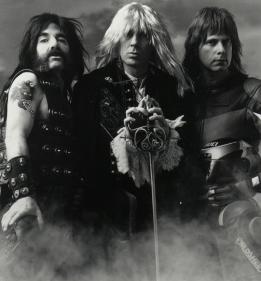
It is easy to see the feminists’ viewpoint here. The lyrics read in part: "I’m gonna chain you, make you sleep outdoors, you're so fetching when you‘re down on all fours, gonna send you back to Bitch School.”
And the picture disc comes with a photograph of a scantily dressed young woman on her knees with a dog collar around her neck.
It is an image remarkably
similar to the rejected cover of the notorious Smell the Glove album
of '82.
Tufnel insists the image came from the
video which they had wanted to open with a field full of dogs. The
video company said no one would be particularly interested in dogs;
young girls were what an audience wanted.
“Ten years ago we’d have been so
immature as to say, ‘Go jump off a building then’ and walk out.
But because we‘re newly mature we said, ‘All right, if we must
put young girls in, then we will.’ So that explains that girl in
the poster . . . and she was very attractive and intelligent.
"I had dinner with her several
nights in a row -- and breakfasts. Her main interest was the 1930s
and the Fabian Society, George Bernard Shaw and the beginnings of the
British Labour Party. I listened to her a lot.”
Tufnel's relationships with women have
never been entirely happy, as he admits. In fact, after the demise of
the band following the Japan tour he travelled without direction to
“experience many languages and to meet many women living strange
lives.”
Unfortunately, while in Switzerland he
was kidnapped and inducted into the Swiss Army.
On his escape he again wandered
aimlessly, this time throughout the South Pacific picking up on the
rhythmic traditions of the PeiPei and Poo Poo Islanders.
But percussion provided only a
diversion for Tufnel and he says he was glad to be back playing
guitar in the context of Tap. He is less pleased about the title
track and the use of guests such as Slash, Beck, Satriani and Steve
Lukather.
"A rather unfortunate story - and
I will tell you now. The space those four chaps used to do their bits
which comes after my solo was actually more of a solo by me. David
and Derek, thinking they were giving me a birthday gift, erased my
track and put them on. They thought the tribute of having Beck and
them would be nice. Beck, of course, said, ‘Yeah, l'll do this for
Nige'. But they forgot to tell Nige, didn’t they?
“It was supposed to be a surprise and
it was like someone saying, 'Would you like a spike up your bum'"
That sort of surprise.
“I was very upset. I can see what
they were trying to do. After my Spanish guitar bit, there was more .
. . but the more is less now. In fact, it’s not there at all!
“It's like someone coming up to
Picasso or Magritte and saying, ‘Go out and have some lunch and
I’ll stay in the studio. He goes out and has his soup and I take a
paintbrush and make a different nose. Picasso comes back and says,
‘Hello, what’s goin' on here, then? Whose nose is that, eh?' It’s
the same.”
And so Break Like the Wind is now, what
might we say, a flawed masterpiece?
"Exactly."
As anyone who has seen the Di Bergi
documentary (“or, if you will, rockumentary“) knows, the
relationship between Tufnel and St Hubbins has occasionally been
testy, largely because Tufnel and St Hubbins' girlfriend, Jeanine
Pettibone, do not hit it off.
Latent envy of each other’s
importance to St Hubbins saw Tufnel quit the band following a
disastrous show at an Air Force base when Pettibone took over
management after Ian Faith quit.
Today the relationship with Pettibone
(who married St Hubbins in ’86) is a stalemate. Tufnel is delighted
she has her own “little business" selling clothing of a
“vibrational significance" in a New Age boutique in
California.
“That's a godsend.” says Tufnel.
"They moved to the States and he thought by them both moving
there that they would become citizens. He didn't realise because they
are both British it wouldn’t work. Anyway she's got this clothing
shop called Potato Republic which specialises in, well, itchy
sweaters, actually."
For the decade that Tufnel wandered, St
Hubbins pursued a production career (unsuccessfully, as it happened)
and collaborated by mail with his father, an amateur musician, on an
all-scat version of Bizet's Carmen.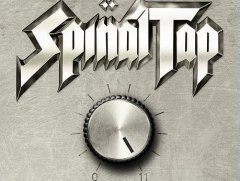
Bassist Smalls stuck with music, too, after a brief foray working for his fathers telephone sanitisation service in Wolverhampton. He wrote hard-rock jingles for the Belgian Milk Advisory Board, then joined the Zeppelin-influenced Christian heavy metal band Lambsblood, who became famous for their mass baptisms and single Whole Lotta Lord.
They played at the "Monsters
of Jesus” festival, but a chance meeting with Tufnel and St Hubbins
at former manager Faith’s funeral led to Smalls’ decision to
“throw in my lot with evil again” when Tap reformed.
These days Tufnel is candid enough to
confess their meeting at Faith's funeral might not have been just
chance.
"Unconsciously, we knew we’d all
be there because we were all so bloody happy he’d died. But if
you'd have asked me at the time I would have said, ‘I dunno, do I?’
At the funeral we were in such a good frame of mind that afterwards
we walked over to my flat and said, ‘Let's pick up the guitars.' It
was infectious and I don’t think rock ’n’ roll can lose the
edge of friction and fighting without losing some of its creativity.
You end up with pop music, which I hate.
“That’s-my most unfavourite thing
in the whole world . . . except for various diseases."
And born out of that friction is Break
Like the Wind, an album of provocative lyrics and anthemic pulses.
From the satanic rock of Christmas with the Devil (“the elves are
dressed in leather”) to a reworked version of their classic Rainy
Day Sun from the mid-Sixties (which bears astonishing similarities to
the Small Faces’ Itchycoo Park and the Beatles’ I Am the Walrus),
Spinal Tap once again show their sure command of all aspects of the
rock idiom.
It is classic Tap and typically not
without controversy. While the lyrics of Bitch School have raised the
ire of feminists and the title raised a laugh from most, a bigger
fight has been bought when Tap misunderstood the environmental issue
of the long box, the wasteful packaging in which CDs are wrapped.
Break Like the Wind initially came in what they termed the “extra long box,” a 45cm disposable package.
“The Extra Long Box is an environmentally conscious product which utilises more of our precious' recycled resources than any other compact disc package,” reads the sticker on the box.
“It’s very
shape pays homage to the trees of our planets noble forests.”
The package was withdrawn.
That glitch aside, Spinal Tap are back
with new management and an album, recorded “in dobly” so you can
hear all the words.
“It's a push-through rather than a
break-through, I think," says Tufnel. “I see what we do as
something constantly evolving. It’s hard to be objective about it
if you’re me. If I was you -- well, you are you -- ummm, if you
were me and . . . umm . . . if you and me were . . . well, anyway.
It's difficult.
“What we‘re saying with this album
is, ‘We‘re back. Join us, won’t you,’ in a consumer sense.”
Yet there is still one troubling cancer
in the Spinal Tap body, a pulled thread in the weave of their rock
tapestry. Rumours constantly circulate that Nigel Tufnel is in fact
Christopher Guest, an American musician and satirist who previously
worked with National Lampoon magazine and created a series of rock
parody albums including Goodbye Pop and Lemmings.
"Yes, I've heard that. And it’s
nice of you to bring it up again and give it more circulation. All I
can say is a rumour is . . . well, it’s no more than a rumour,
really, is it?”
And with that, Nigel Tufnel, one of
rock’s more profound thinkers and inventive musicians is gone.
There are more interviewers wanting a piece of him, this man at the
peak -- or another horizontal peak -- of a career with rock’s most legendary
legend.
Curiously, you can only more or less
understand Spinal Tap when you talk to Tufnel.
Less, actually.
For another perspective on Spinal Tap see here.



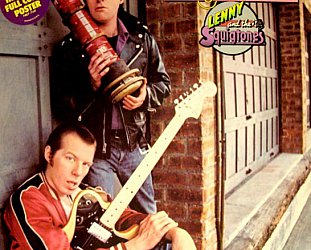
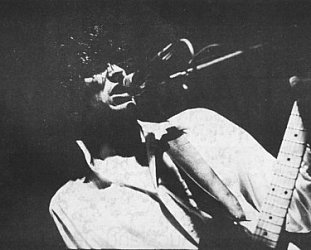


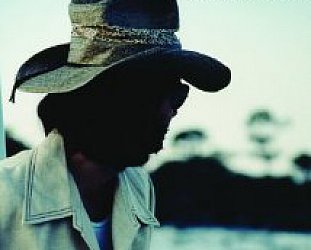
post a comment